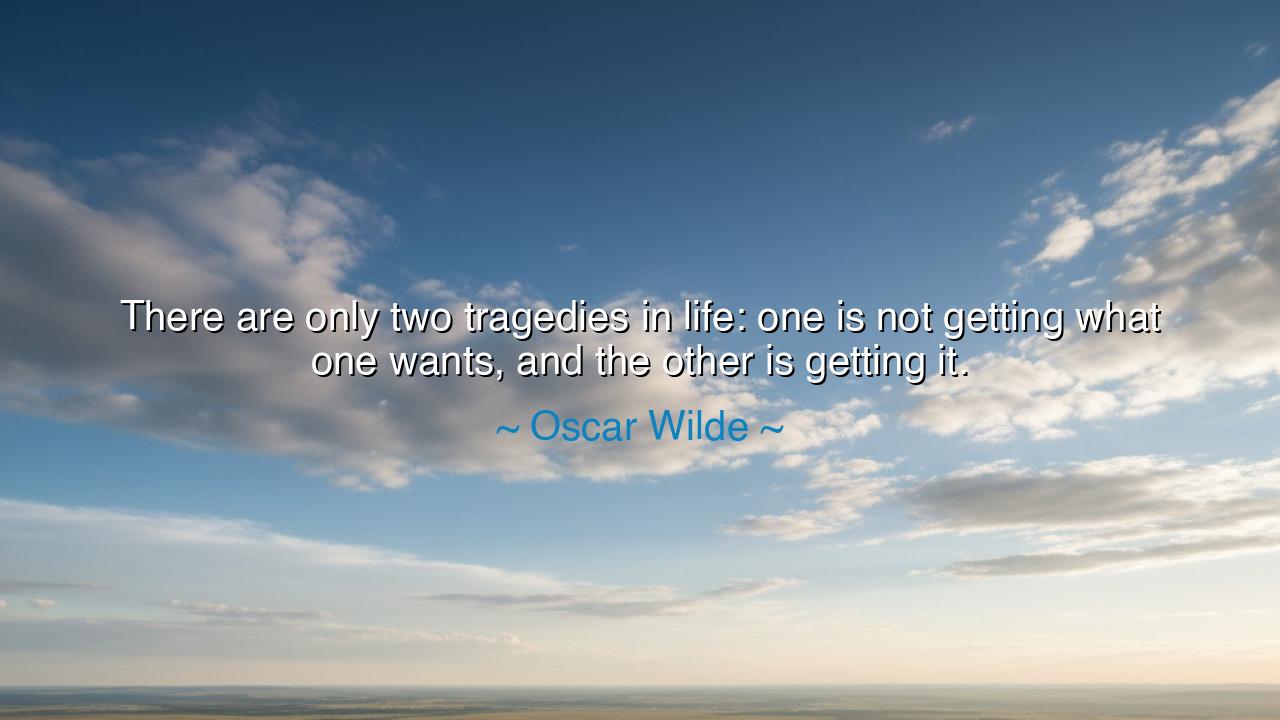
There are only two tragedies in life: one is not getting what one
There are only two tragedies in life: one is not getting what one wants, and the other is getting it.






“There are only two tragedies in life: one is not getting what one wants, and the other is getting it.” Thus wrote Oscar Wilde, master of wit and revealer of paradox, whose words cut deep into the restless desires of the human soul. In this teaching lies a wisdom that startles at first, for how can both lack and fulfillment be called tragedies? Yet Wilde speaks to the eternal hunger of man, the ceaseless longing that neither denial nor attainment can ever fully satisfy.
The ancients, too, knew this truth. The Greeks told of King Midas, who prayed that all he touched might turn to gold. His wish was granted, and yet it became his curse—for even food and drink turned to lifeless metal in his hands. Here was the second tragedy: to get what one wants, only to discover that it destroys the very joy one sought. Thus Wilde’s paradox is not jest alone but an echo of ancient wisdom: desire is both torment in its absence and disappointment in its fulfillment.
Consider the tale of Alexander the Great. He conquered the known world while still a young man, achieving all that ambition could dream. And yet, when there were no more lands to conquer, he wept, for his heart was still unsatisfied. He had avoided the first tragedy—he had gained what he wanted—but fell into the second, for fulfillment brought him no peace. His story, like Wilde’s words, reminds us that the human soul, when chained to desire, is never content.
Yet the other tragedy is no less bitter: to want and never receive. Countless lives are spent chasing dreams that remain out of reach. The artist who longs for recognition that never comes, the lover whose affection is never returned, the laborer who dreams of freedom yet remains in bondage—these suffer the tragedy of endless longing. They know the ache of unfulfilled desire, the gnawing wound of “not yet” and “never.”
Wilde’s wisdom, then, is not to mock life but to reveal its irony: that desire itself is the root of human sorrow. When we are denied, we ache; when we are granted, we still ache, for the dream, once touched, rarely matches the brilliance it held in imagination. Thus he shows us the vanity of unrestrained longing, and the necessity of finding meaning beyond desire itself.
O children of the future, hear this with open hearts: happiness is not found in the endless chase of wants. If you believe joy lies only in obtaining, you will taste both tragedies in turn. But if you learn to hold desires lightly, to find peace in the journey rather than the end, you will rise above both. For the wise do not despise desire, but they do not become its slaves.
The lesson is clear: temper your desires with wisdom. Strive, yes, but do not bind your soul to the illusion that fulfillment will complete you. When you lack, be patient; when you gain, be grateful but not consumed. The truest freedom lies not in having everything, nor in losing everything, but in mastering the restless fire of want.
Therefore, let your practice be this: cultivate gratitude for what is already in your hands, patience for what has not yet come, and humility when you are granted your wishes. Teach your children that neither getting nor not getting is the true measure of life, but the spirit with which you live through both.
So I say unto you: remember Wilde’s paradox. The tragedies of life are desire denied and desire fulfilled—but the triumph of life is to live beyond them, to find joy not in the hunger or in the feast, but in the wisdom of the soul that knows peace in all seasons.






AAdministratorAdministrator
Welcome, honored guests. Please leave a comment, we will respond soon